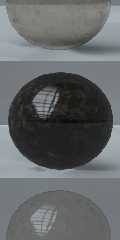|
 |
Hi,
I am trying to make a texture that looks like old dirty glass.
I am rendering the object using an HDR probe and no lightsources and my test
renders were running fairly quickly until I started using a texture_map with
layered textures.
I noticed that when I apply a texture using a texture_map (e.g. bozo going from
clean to dirty glass) the performance of the radiosity stage is terrible
compared to a single layered texture (about 10 times slower).
Also, I noticed it looks like you can see the dirt on the interior surface (top
image below) which I suppose is expected but not what I wanted.
I figured I could fix this by applying a clean glass material to the interior
object which created the image in the middle (not what I was expecting, is there
a simple explanation for this one that I do not know?) also the performance was
still bad.
Next I tried adding a simple:
texture { pigment { rgbt 1 } }
to the interior object and that produced the bottom image which rendered a lot
quicker.
The question is What woudld the correct approach be to producing such an
object/texture?
If it helps the texture(s)/object code is shown below below:
#declare dirt = texture {
pigment { bozo scallop_wave turbulence 0.8753 omega 0.775 lambda 3.2 octaves
7
colour_map {
[ 0.0 rgbt 1 ]
[ 0.75 rgbt 1 ]
[ 0.75 rgbt <0.5, 0.34, 0.25, 1> ]
[ 0.9 rgbt <0.25, 0.2, 0.15, 0.5> ]
[ 1.0 rgbt <0.5, 0.34, 0.25, 1.0> ]
}
scale 0.02
}
normal { granite 0.5 scale 0.001 }
finish { diffuse albedo 0.81 reflection { 0.001 0.01 fresnel on } }
}
#declare vdirt = texture {
pigment { bozo scallop_wave turbulence 0.8753 omega 0.775 lambda 3.2 octaves
7
colour_map {
[ 0.0 rgbt 1 ]
[ 0.55 rgbt 1 ]
[ 0.55 rgbt <0.25, 0.14, 0.09, 1> ]
[ 0.9 rgbt <0.08, 0.06, 0.045, 0.125> ]
[ 1.0 rgbt <0.25, 0.14, 0.09, 0.45> ]
}
scale 0.02
}
normal { granite 0.5 scale 0.001 }
finish { diffuse albedo 0.75 reflection { 0.001 0.005 fresnel on } }
}
#declare lampGlassTex = texture
{
pigment {
rgbf <0.99, 0.96, 0.92, 1>
}
finish {
specular 0
roughness 0.002
ambient 0
diffuse albedo 0.125
brilliance 4
reflection {
0.01, 0.2
fresnel on
}
conserve_energy
}
normal { granite 0.01 turbulence 0.5 scale <0.04, 0.1, 0.04> }
}
#declare lampGlassTexDirt = texture
{
lampGlassTex
}
texture { dirt scale 4 }
#declare lampGlassTexVDirt = texture
{
lampGlassTex
}
texture { vdirt scale 4 }
#declare theTex = material{
texture {
bozo scallop_wave turbulence 0.675 omega 0.7
texture_map {
[ 0.0 lampGlassTexVDirt ]
[ 0.15 lampGlassTexDirt ]
[ 1.0 lampGlassTex ]
}
scale 0.22
// translate <0, -1.1, 0>
}
interior {
ior 1.5
fade_distance 0.5
fade_power 1001
}
}
difference {
sphere { <3, 2, 0> 1
}
sphere { <3, 2, 0> 0.95
// uncomment either single texture used for interior
// texture { pigment { rgbt 1 } }
//
// or material used for interior
//
//material { texture { lampGlassTex } interior {
// ior 1.5
// fade_distance 0.5
// fade_power 1001
// }
// }
}
material {
theTex
}
}
Thanks
Sean
Post a reply to this message
Attachments:
Download 'glass.png' (170 KB)
Preview of image 'glass.png'

|
 |
|
 |
"Cousin Ricky" <rickysttATyahooDOTcom> wrote:
> What are your radiosity settings?
>
> Which version of POV-Ray are you using?
Hi,
I am using 3.7 RC7 and the radiosity settings are below they are very low
quality as I reduced them to trace the sample images just to speed up the
renders as I was too impatient to wait:
#default{ finish{ ambient 0 diffuse 1 conserve_energy }}
// radiosity (global illumination) settings
global_settings {
assumed_gamma 1.0
radiosity {
pretrace_start 0.08
pretrace_end 0.01
count 50
nearest_count 10
error_bound 1.2
recursion_limit 2
low_error_factor .5
gray_threshold 0.0
minimum_reuse 0.015
brightness 1
adc_bailout 0.01/2
normal on
}
}
originally I had pretrace_end 0.001, count 900, nearest_count 20 and error_bound
0.8 but other than with the simple interior texture it was too slow to wait for
any image with just a single sphere image ;-)
Sean
Post a reply to this message
|
 |




![]()